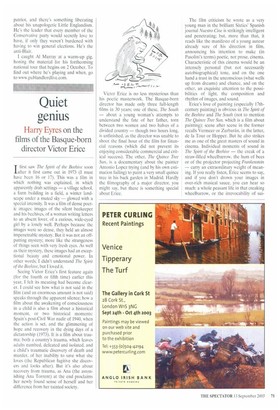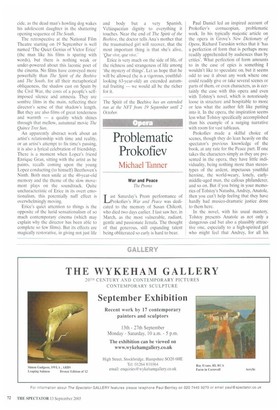Quiet genius
Harry Eyres on the films of the Basque-born director Victor Erice
IT first saw The Spirit of the Beehive soon it first came out in 1973 (I must have been 16 or 17). This was a film in which nothing was explained, in which apparently drab settings — a village school, a farm building in a field, a winter landscape under a muted sky — glowed with a special intensity. It was a film of dense poetic images: images of the silent beekeeper and his beehives, of a woman writing letters to an absent lover, of a curious, wide-eyed girl by a lonely well. Perhaps because the images were so dense, they held an almost impenetrable mystery. But it was not an offputting mystery; more like the strangeness of things seen with very fresh eyes. As well as their mystery, these images had an exceptional beauty and emotional power. In other words; I didn't understand The Spirit of the Beehive, but I loved it.
Seeing Victor Erice's first feature again (for the fourth or fifth time) earlier this year, I felt its meaning had become clearer. I could see how what is not said in the film (and an enormous amount is not said) speaks through the apparent silence; how a film about the awakening of consciousness in a child is also a film about a historical moment, or two historical moments: Spain's post-Civil War nadir of 1940, when the action is set, and the glimmering of hope and recovery in the dying days of a dictatorship (1973). It is a film about trauma; both a country's trauma, which leaves adults numbed, defeated and isolated, and a child's traumatic discovery of death and murder, of her inability to save what she loves (the Republican fugitive she discovers and looks after). But it's also about recovery from trauma, as Ana (the astonishing Ana Torrent) at the end proclaims her newly found sense of herself and her difference from her tainted society. Victor Erice is no less mysterious than his poetic masterwork. The Basque-born director has made only three full-length films in 30 years; one of these, The South — about a young woman's attempts to understand the fate of her father, torn between two women and two halves of a divided country — though two hours long, is unfinished, as the director was unable to shoot the final hour of the film for financial reasons (which did not prevent its enjoying considerable commercial and critical success). The other, The Quince Tree Sun, is a documentary about the painter Antonio Lopez trying (and by his own estimation failing) to paint a very small quince tree in his back garden in Madrid. Hardly the filmography of a major director, you might say, but there is something special about Erice. The film criticism he wrote as a very young man in the brilliant Sixties' Spanish journal Nuestro Cine is strikingly intelligent and penetrating; but, more than that, it reads like the manifesto of a young auteur already sure of his direction in film, announcing his intention to make (in Pasolini's terms) poetic, not prose, cinema. Characteristic of this cinema would be an intensely personal (but not necessarily autobiographical) tone, and on the one hand a trust in the unconscious (what wells up from dreams) and chance, and on the other, an exquisite attention to the possibilities of light, the composition and rhythm of images, and sound.
Erice's love of painting (especially 17thcentury painting) is obvious in The Spirit of the Beehive and The South (not to mention The Quince Tree Sun, which is a film about painting); scene after scene in the former recalls Vermeer or Zurbaran, in the latter, de la Tour or Hopper. But he also strikes me as one of the great masters of sound in cinema. Individual moments of sound in The Spirit of the Beehive — the creak of a straw-filled wheelbarrow, the hum of bees or of the projector projecting Frankenstein — carry an extraordinary weight of meaning. If you really listen, Erice seems to say, and if you don't drown your images in over-rich musical sauce, you can hear so much: a whole peasant life in that creaking wheelbarrow, or the irrevocability of sui cide, as the dead man's howling dog wakes his adolescent daughter in the shattering opening sequence of The South.
The retrospective at the National Film Theatre starting on 19 September is well named 'The Quiet Genius of Victor Erice' (the man like his films is sparing with words), but there is nothing weak or under-powered about this laconic poet of the cinema. No films have conveyed more powerfully than The Spirit of the Beehive and The South, for all their metaphorical obliqueness, the shadow cast on Spain by the Civil War, the costs of a people's selfimposed silence and amnesia. They are sombre films in the main, reflecting their director's sense of that shadow's length. But they are also films of great tenderness and warmth — a quality which shines through that mellow, autumnal movie The Quince Tree Sun.
An apparently abstract work about an artist's relationship with time and reality, or an artist's attempt to fix time's passing, it is also a lyrical celebration of friendship. There is a moment when Lopez's friend Enrique Gran, sitting with the artist as he paints, recalls coming upon the young Lopez conducting (to himself) Beethoven's Ninth. Both men smile at the 40-year-old memory and the theme of the slow movement plays on the soundtrack. Quite uncharacteristic of Erice in its overt emotionalism, this potentially naff effect is overwhelmingly moving.
Erice's quiet attention to things is the opposite of the lurid sensationalism of so much contemporary cinema (which may explain why the director has been able to complete so few films). But its effects are magically restorative, in giving not just life and body but a very Spanish, Velazquezian dignity to everything it touches. Near the end of The Spirit of the Beehive, the doctor tells Ana's mother that the traumatised girl will recover, that the most important thing is that she's alive, `Que vive, que vive.'
Erice is very much on the side of life, of the richness and strangeness of life among 'the mystery of things'. Let us hope that he will be allowed (he is a vigorous, youthfullooking 63-year-old) an extended autumnal fruiting — we would all be the richer for it.
The Spirit of the Beehive has an extended rim at the NFT from 19 September until 2 October.



























































































 Previous page
Previous page